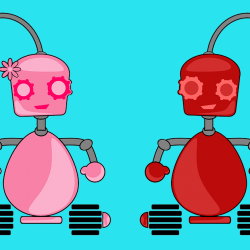Sexbot Perspectives: Data Ownership and Security Will Be Crucial for Sex Robot Users
Roboticist Dr. Kit Stubbs on creating a positive future for sex tech.

As part of our ongoing “Sexbot Perspectives” series, we’ve asked several experts this question: What is the potential or the possible pitfalls of developing sex robots? Our aim: To create dialogue and help shape the best possible future—one that will be deeply influenced by breakthroughs in artificial intelligence and robotics.
Kit Stubbs is a non-binary/queer/pansexual entrepreneur with a Ph.D. in robotics, who uses the pronouns they/them/their. Working to expand the definition of “sex,” Stubbs says they care more about people than technology.
After graduating from Carnegie Mellon University in 2008, they founded the Effing Foundation for Sex Positivity—a non-profit on a mission to lessen sexual shame and support sex-positive projects. They also run a sex- and kink-positive meetup group in Boston that helps people create their own sex toys, and blogs at The Toy Maker Project.
One of Stubbs’s claims to fame is their light-up dildo prototype “The Hammer.” It won a Golden Kleene at the Arse Elektronika 2012 sex tech conference, and was later deemed “the most amazingly nerdy sex toy ever constructed” by Cracked.com.
So without further ado, here are Stubbs’s views on sex robots.
[box type=”shadow”]
“What is the potential or the possible pitfalls of developing sex robots?”
This begs the question: What is a sex robot, anyway? Where is the line between “sex toy” and “sex robot”?
The first thing I learned when starting grad school in robotics was that even roboticists can’t agree on what defines a robot. Many people would say that a robot should have some way to gather information about its environment (sensing) and use that information to interact with the environment (actuation). So…does that make a thermostat a robot? It can tell what temperature a room is (sensing), and based on that information, send a signal to make the room warmer or colder (actuation).
We’ve already seen a handful of sex toys that respond to how they are played with, including the Ambrosia, by the now-defunct Orgasmatronics, Inc., and the HUM. As far as I’m aware, the only outcry about these and other essentially robotic toys has been the pleasured moans of their happy owners.
If, by “sex robot,” you’re particularly interested in (or concerned about) about robots that look and behave like humans: you have a very long wait ahead of you. After spending years behind-the-scenes with robotics and computer science researchers, I can say confidently that robots are a fickle bunch. As soon as the hardware is working, the software crashes. Once the code is fixed, a motor dies or a joint breaks. (This is why the grad students at Carnegie Mellon’s Robotics Institute, where I got my degree, joke that every time you touch a robot, it adds a year to your Ph.D.)
The amount of electromechanical wizardry needed to build a humanlike robot capable of (and durable enough to withstand) sexual activity is astonishing, not to mention the staggeringly sophisticated artificial intelligence programming you would need to keep verbal and non-verbal interactions from falling flat. I doubt we’ll ever see this kind of sex android in my lifetime.
That said, I’m generally excited about the prospect of sex toys which can sense and respond to their owners. We have the potential to build toys which can show us information about our own bodies and toys which are more accessible to more people, regardless of body size or level of (dis)ability.
My concerns about the future of sex/tech are threefold:
-
-
Security and privacy. Any sex toy connected to a phone or computer is potentially at risk for being remotely observed or controlled without its owner’s permission. At DEFCON 24, New Zealand hackers known as goldfisk and follower demonstrated that the connection between the WeVibe 4 Plus and its app is insecure, allowing them to seize control of the toy. Would you want a stranger turning your vibrator on and off? How about downloading data about your sexual habits? The more sophisticated and robotic our toys become, the greater the need for toy developers and manufacturers to prioritize computer security.
-
Data ownership. For toys that collect information about us, like the We-Vibe 4 Plus and the upcoming Lioness, we have to consider: Who owns this (very) personal data? What do toy companies do with it? We should all have the right to download the data our toys collect about us in an open format, enabling us to further explore our data and giving us the option of contributing to citizen science efforts around human sexuality.
-
Sexuality education. If we want to live in a world where using sex toys either alone or with partners is widely recognized as a normal and healthy part of human sexuality, we need comprehensive, age-appropriate, queer- and trans-inclusive human sexuality education.
-
Whether you’re concerned about data-collecting sex toys or the prospect of sophisticated sex androids, focusing on security, data ownership, and comprehensive sexuality education puts us in a good position to face the future of sex/tech.
[/box]
Image source: Kelly Teague
Leave a reply
You must be logged in to post a comment.

















